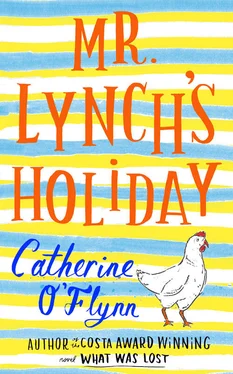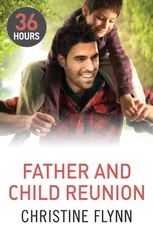He cast about the room and eventually saw him hovering with an empty plate in hand at the end of the buffet table. Laura sat with a group of Eamonn’s cousins at a nearby table, drinking and chatting with an ease Eamonn had never possessed. Eamonn stood on his own peering suspiciously at some chicken wings and Dermot wondered what crime they had committed. His son had been home for three days and it had been odd to have him back in the house, sleeping in his old room. He’d offered to help with arrangements but Dermot had preferred to do it all himself. In the end, purely to give him something to do, he asked him to sort through all the old photos. He’d only wanted them gathered together neatly in a box, but Eamonn had covered the living-room floor to sort them in some kind of order and driven Dermot half-mad, getting under his feet, spreading the job over two days and insisting on laboriously explaining the different piles to Dermot as he was hurrying to get dressed for the funeral that morning.
Eamonn had now reached the end of the buffet table, having taken nothing, as far as Dermot could see, but a tomato and a bread roll. He hesitated, plate in hand, deciding where to sit. He looked vulnerable and uncertain and Dermot saw him for a moment as a little boy again, waiting for him at the entrance to the garage. Eamonn looked across the room and met his father’s eyes. Standing on opposite sides of the crowded room, they raised a hand at one another and then each went off to find somewhere to be.
Eamonn paused in the doorway for a moment to watch him, registering as he did the familiarity of the posture. It was almost matronly — back straight, arms folded on chest, feet tucked under and crossed. This curiously attentive pose was how his father relaxed, whether in a pub or in front of the television, leaning slightly forward, head inclined to one side. As a gentle snoring struck up, Eamonn realized with some surprise that it was also how he took his naps. He moved quietly to the other side of the room to check Dermot was actually asleep. He frowned at the image — his father sleeping like a budgerigar. There was a strange novelty in the sight. He had very rarely seen him asleep. Occasionally, when sharing a room with his parents on holidays, he had woken in the night and listened to the intricate counterpoint of their snoring. His father’s high and wheezy, his mother’s deep and rumbling. The longer he listened the harder he found it to connect the sounds — simultaneously animal and mechanical — to the people. He would sneak over to their bed to look at their faces, to reassure himself that they were still his parents and that he should not be scared.
The intimacy of sharing a space with his father once more was unsettling. He found his gaze constantly zooming in and refocusing on certain details at once both mysterious and mundane. He was assailed by things that as a boy were so everyday as to be invisible, and as an adult he had not been around to see. The way his father read a newspaper, folded up into a neat square and held close to his face. The manner in which he ate: a bit of everything on the fork, peas carefully halved to avoid imbalance. The sound of his razor scraping his chin, the smell of his soap. All these things Eamonn had forgotten and each one triggered a complex mix of recognition and distance, a nostalgia for something still there. His father both alive and dead.
He couldn’t recall Dermot ever taking a nap before. He had noticed a few small signs of age since his arrival. Nocturnal trips to the toilet, the occasional effortful noise when standing or sitting. He remained, Eamonn was sure, fitter and healthier than himself, but there was a change nonetheless. Eamonn didn’t know whether his father had aged a little in the months since his mother had died, or whether he had just seemed younger and more vital next to her.
He would one day become authentically frail and need someone to care for him, and, as his only child, it would be Eamonn’s responsibility. This was something he had known for many years, but still he found it impossible to believe. Strength was one of his father’s defining features, never something he had made a show of, but his sheer physical presence made it clear. There was a power within him, a manifest capability. At Kathleen’s funeral Eamonn had offered to return from Spain, to rent out the apartment when such a thing was remotely possible, and to live nearby, but the offer was gestural. He didn’t believe that his father needed or wanted him around and he knew moreover that he would never accept such an offer.
Beyond an assumption of some kind of standardized grief, he had not considered how the loss of his mother had affected his father. In some ways, neither had he considered how her loss had affected him. Living in Lomaverde, at such a remove, he was not confronted by her absence every day. It wasn’t that he pictured her still alive, but neither did he always remember that she was gone, or consider the reality of Dermot’s day-to-day life on his own. It was easy to not think too much about it, to half-imagine things essentially unchanged.
Laura had encouraged him to ring home more often, but Eamonn felt she didn’t understand how self-sufficient his father was, didn’t really get the nature of his relationship with his father at all. ‘We don’t live in each other’s pockets,’ he’d say. ‘We don’t need to be talking to one another all the time.’ Besides, Dermot was surrounded by Kathleen’s relatives back in Birmingham. That was part of it, though Eamonn tried not to admit it, even to himself. A long-held suspicion that his dad was easier in the company of some of his nephews than his son. Eamonn’s cousin Brendan, for example. A man of few words who knew how to strip an engine and place an accumulator bet. Dermot saw him a lot. They seemed able to communicate in a language Eamonn had never learned.
The snoring built slowly to a peak with the loud finale inevitably rousing the sleeper.
‘Oh …’ His eyes opened and focused on Eamonn. Dermot smiled, embarrassed. ‘I was asleep.’
Eamonn nodded.
‘I wasn’t the driver.’
‘Sorry?’
‘I was dreaming I was stuck in traffic on College Road, but I wasn’t the driver. I was sat upstairs with all the bloody kids.’
‘You must have been glad to wake up.’
‘I don’t know who was driving the bus.’ He said this as if he should have known.
‘Maybe there was no driver.’
Dermot looked at him as if he were an idiot. ‘Someone was driving the bus, son. They don’t drive themselves.’
Eamonn scratched his head. ‘Went OK at Jean and David’s, did it?’
‘Yes. Very nice. They were advocating being a grandparent.’
‘Right.’
‘Did I tell you about Keiron, Brendan’s eldest?’
‘What about him?’
‘He’s gone and got his girlfriend pregnant. Fifteen years old, the pair of them. At the same school. So Brendan’s going to be a granddad.’
‘Christ.’ Eamonn felt the familiar mixture of awe and horror. He remembered seeing his cousin nonchalantly smoking in the park when they were children. Brendan seemed grown up when he was eight. He had left school at sixteen while Eamonn went on to university, the only one in the family to do so. He imagined that, to Brendan, his other cousins and perhaps his own father, he would forever be thought of as a student — a pejorative label meaning someone daft, lazy and essentially childish.
‘He was asking me the other day what you did out here, job-wise. And to be honest I couldn’t tell him. Was it something to do with computers? I can’t remember now what your mother said.’
‘It was the same job I had back home.’
‘Oh,’ said Dermot uncertainly, ‘they have an office out here, do they?’
Читать дальше












